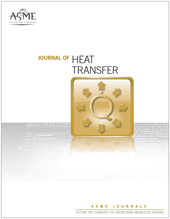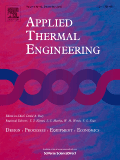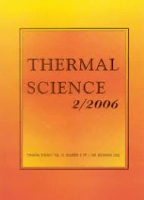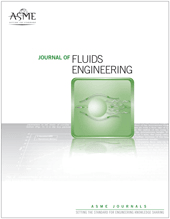
INTERNATIONAL JOURNAL OF HEAT AND FLUID FLOW
Scope & Guideline
Advancing the Frontiers of Heat and Fluid Dynamics
Introduction
Aims and Scopes
- Heat Transfer Mechanisms:
Research on various heat transfer mechanisms including conduction, convection, and radiation, with a focus on both theoretical and experimental studies. - Fluid Dynamics:
Exploration of fluid flow behaviors in different settings, including turbulent and laminar flows, with applications in engineering and environmental contexts. - Thermal Management Systems:
Development and optimization of thermal management systems, including heat exchangers, cooling systems, and thermal storage technologies. - Numerical Modeling and Simulation:
Utilization of computational fluid dynamics (CFD) and other numerical methods to model complex fluid and thermal interactions, providing insights into real-world applications. - Innovative Materials and Nanofluids:
Investigation into the properties and applications of novel materials and nanofluids for enhanced thermal performance in various systems. - Renewable Energy Systems:
Research related to the thermal and fluid dynamics aspects of renewable energy systems, including solar thermal applications and energy-efficient technologies.
Trending and Emerging
- Advanced Computational Techniques:
Increasing use of machine learning, artificial intelligence, and advanced numerical methods in modeling and predicting heat transfer and fluid flow phenomena. - Nanofluids and Hybrid Materials:
Growing interest in the study of nanofluids and hybrid materials for enhanced thermal properties and performance in various applications. - Sustainable Energy Solutions:
Research focused on sustainable energy systems, including thermal management in renewable energy applications, is becoming more prominent. - Multi-Phase Flow Dynamics:
Emerging studies on multi-phase flows, particularly in complex systems, reflect a shift towards understanding interactions in real-world applications. - Thermal Management in Electronics:
Increased focus on thermal management strategies for electronic devices, highlighting the importance of heat dissipation techniques in modern technology.
Declining or Waning
- Basic Heat Transfer Principles:
Research papers focusing solely on fundamental heat transfer principles have decreased, likely due to the advancement in applied research and technology. - Static Heat Exchanger Designs:
Studies centered around traditional, static designs of heat exchangers appear to be waning as more dynamic and innovative designs gain traction. - Conventional Fluid Mechanics:
Research on conventional fluid dynamics without consideration of modern computational methods or advanced materials is becoming less common. - Simplistic Models for Turbulent Flow:
Basic models for turbulent flow that do not incorporate advanced simulation techniques or real-world complexities are less frequently published. - Single-Phase Fluid Studies:
Research focusing solely on single-phase fluid dynamics is declining as interest shifts towards multi-phase flows and complex thermal interactions.
Similar Journals

JOURNAL OF HEAT TRANSFER-TRANSACTIONS OF THE ASME
Fostering Innovation in Heat Transfer Technologies.JOURNAL OF HEAT TRANSFER-TRANSACTIONS OF THE ASME, with ISSN 0022-1481 and E-ISSN 1528-8943, is a leading publication in the field of heat transfer, mechanical engineering, and related disciplines, published by the renowned American Society of Mechanical Engineers (ASME). This esteemed journal, which has been in circulation since 1945, provides a platform for novel research findings and reviews that the mechanical engineering community can rely upon, contributing significantly to the advancement of knowledge in heat transfer processes. The journal is recognized for maintaining a strong impact in several categories, attaining Q2 quartile rankings in Condensed Matter Physics, Mechanical Engineering, and Mechanics of Materials, reflecting its influential role in shaping scientific dialogues. With a commendable Scopus ranking, including a percentile of 63rd in Mechanical Engineering, it attracts submissions from leading researchers and industry professionals alike. Although access options are currently undergoing changes, the commitment to disseminating cutting-edge research remains steadfast. Gathering insights from historical and contemporary studies, the JOURNAL OF HEAT TRANSFER stands as a vital resource for those aiming to innovate in heat transfer technologies and methodologies.

APPLIED THERMAL ENGINEERING
Driving excellence in energy and fluid dynamics research.Applied Thermal Engineering is a leading international journal dedicated to the field of thermal engineering, published by Pergamon-Elsevier Science Ltd. With an impressive impact factor indicating its significance in the academic community, this journal focuses on innovative research and developments related to energy engineering, fluid flow, and transfer processes, as well as manufacturing and mechanical engineering. Being indexed in top quartiles (Q1) across multiple categories, it ranks exceptionally well on platforms like Scopus, ensuring that contributors reach a wide and relevant audience. The journal supports both open access and subscription options, promoting the dissemination of vital research findings from 1996 to 2024. With its commitment to advancing the discipline and implementing rigorous peer-review processes, Applied Thermal Engineering serves as an essential resource for researchers, industry professionals, and students aiming to stay abreast of the latest advancements and applied methodologies in thermal science.

International Journal of Heat and Technology
Bridging Theory and Practice in Heat EngineeringThe International Journal of Heat and Technology is a premier academic publication dedicated to the dissemination of innovative research in the fields of thermal engineering, fluid mechanics, and condensed matter physics. Published by the INT INFORMATION & ENGINEERING TECHNOLOGY ASSOCIATION and based in Italy, this journal has been a significant resource for researchers and professionals since its inception in 1983, with a commitment to advancing knowledge until 2024. With an impact factor that reflects its relevance, the journal encompasses diverse topics within its scope, bridging gaps between theoretical research and practical applications. Although currently not open access, the journal provides valuable insights into the nuances of heat transfer, flow dynamics, and material properties, making it a critical reference for academia and industry alike. The journal's Scopus rankings position it within the competitive landscape of chemical and mechanical engineering, highlighting its contribution to advancing these fields. We invite scholars, professionals, and students to engage with the rich content provided within its pages, to foster a deeper understanding of heat and technology in our rapidly evolving world.

Transactions of the Korean Society of Mechanical Engineers B
Elevating the discourse in mechanical engineering research.Welcome to the Transactions of the Korean Society of Mechanical Engineers B, a pivotal journal dedicated to advancing the field of mechanical engineering. Published by the esteemed Korean Society of Mechanical Engineers, this journal serves as a platform for the dissemination of innovative research and practical applications in mechanical engineering and related disciplines. With a focus on fostering knowledge exchange and collaboration, the journal publishes original research articles, reviews, and technical notes that contribute to the understanding and evolution of mechanical systems and technologies. The Transactions of the Korean Society of Mechanical Engineers B, which has been in circulation since 2007 and spans through 2024, is categorized within the Q4 quartile of mechanical engineering rankings and is indexed by Scopus, making it a valuable resource for researchers and professionals aiming to stay abreast of the latest developments in the field. Although it is not open access, its rigorous peer-review process ensures the integrity and quality of the published work, making it essential reading for academics and practitioners alike.

Thermal Science
Fostering collaboration in the pursuit of thermal innovations.Thermal Science is an esteemed open-access journal published by the Vinca Institute of Nuclear Sciences in Serbia. With a rich focus on the field of thermal science, this journal has established itself as a vital resource for researchers and professionals interested in the dynamics of energy, renewable energy systems, and environmental sustainability. Since its inception in 2001, Thermal Science has dedicated itself to disseminating high-quality research that addresses the challenges of contemporary thermal technologies. The journal has converged its years of publication from 2007 to 2024 and currently holds a Q4 ranking in the category of Renewable Energy, Sustainability, and the Environment, with a Scopus rank of #172 out of 270, placing it in the 36th percentile. This makes it a crucial platform for sharing innovations and findings that contribute to the development of sustainable energy solutions. With open access options available, Thermal Science ensures that knowledge is readily accessible, fostering collaboration and advancement in this critical field.

JOURNAL OF ENHANCED HEAT TRANSFER
Elevating Standards in Mechanical Engineering and Fluid DynamicsThe JOURNAL OF ENHANCED HEAT TRANSFER, published by BEGELL HOUSE INC, is a prominent resource for researchers and professionals in the fields of mechanical engineering, fluid flow and transfer processes, and condensed matter physics. With a history spanning from 1993 to 2024, this journal offers a platform for disseminating cutting-edge research and innovations that enhance our understanding of heat transfer phenomena. Although it operates under a traditional subscription model, its impressive standing is underscored by its Scopus rankings—positioned within the 59th percentile for Mechanical Engineering and 58th percentile for Fluid Flow and Transfer Processes. Additionally, it holds Q2 and Q3 categorizations in relevant fields, reflecting its importance in advancing knowledge and applications in heat transfer technology. This journal effectively bridges the gap between theoretical insights and practical solutions, making it an indispensable tool for academics, industrial practitioners, and students eager to explore advancements in thermal management and efficiency.

JOURNAL OF FLUIDS ENGINEERING-TRANSACTIONS OF THE ASME
Unveiling Insights in Thermal and HydrodynamicsJOURNAL OF FLUIDS ENGINEERING-TRANSACTIONS OF THE ASME, published by the renowned American Society of Mechanical Engineers (ASME), stands as a pivotal platform for disseminating cutting-edge research in the field of mechanical engineering, specifically focusing on fluid mechanics and its diverse applications. With an established history dating back to 1897, this journal features research that pushes the boundaries of knowledge and technology in areas such as fluid dynamics, thermal engineering, and hydrodynamics. Although it is not an open-access journal, it maintains rigorous peer-review standards, ensuring the publication of high-quality scholarly articles that contribute to the academic and professional community. In the latest rankings, it holds a respectable position within the Q2 category of mechanical engineering journals, reflecting its significant impact, as evidenced by its Scopus rank of #204 out of 672, placing it in the 69th percentile. Researchers, professionals, and students alike will find this journal to be a vital resource for the latest developments and innovative insights in fluids engineering.

Journal of Engineering Thermophysics
Connecting theory and practice in the realm of thermophysics.Journal of Engineering Thermophysics, published by PLEIADES PUBLISHING INC, is a premier academic journal dedicated to advancing the field of thermophysics and its applications across a variety of engineering disciplines. With an ISSN of 1810-2328 and an E-ISSN of 1990-5432, this journal offers an essential platform for researchers and professionals to disseminate cutting-edge findings on the interplay between thermal processes and engineering systems. As of 2023, it is recognized within the Q3 category in key fields such as Condensed Matter Physics, Energy Engineering and Power Technology, Environmental Engineering, and Modeling and Simulation. Moreover, the journal contributes to an important dialogue in the environmental sciences, ranking 111 out of 197 in Environmental Engineering, and positions itself prominently within the academic landscape from its establishment in 2007. Although currently not an open-access journal, it facilitates a selective yet impactful communication of research that drives innovation and knowledge in the thermal sciences. For those engaged in understanding the thermal dynamics essential for sustainable engineering solutions, the Journal of Engineering Thermophysics is the go-to resource for published research, reviews, and advancements in the field.

ASME Journal of Heat and Mass Transfer
Advancing the Frontiers of Thermal ScienceASME Journal of Heat and Mass Transfer, published by the renowned American Society of Mechanical Engineers (ASME), is a pivotal journal in the fields of mechanical engineering and materials science. With its ISSN 2832-8450 and E-ISSN 2832-8469, this journal aims to disseminate high-quality research focused on the principles and applications of heat transfer and mass transfer phenomena. Despite its recent launch, having converged from 2023 to 2024, it has quickly established a significant presence in the academic community, holding respectable rankings within the Scopus database across various categories—including a 66th percentile rank in Mechanical Engineering. The journal endeavors to foster innovation and collaborative research that advance the frontiers of knowledge in thermal sciences, making it an essential resource for researchers, practitioners, and students keen on exploring the challenges and developments in heat and mass transfer technologies. The journal also embraces an open-access model, ensuring that leading research reaches a broader audience and contributes to global knowledge sharing.

Heat Transfer
Pioneering new frontiers in thermal management technologies.Heat Transfer, published by WILEY, is a leading open-access journal dedicated to advancing the field of heat transfer science, encompassing innovative research and application across various domains. With an ISSN of 2688-4534 and an E-ISSN of 2688-4542, the journal aims to provide a platform for researchers to disseminate their findings from 2020 to 2024, focusing on condensed matter physics and fluid dynamics. Ranked in the Q2 category for both Condensed Matter Physics and Fluid Flow and Transfer Processes, it showcases articles that contribute significantly to the understanding and utilization of heat transfer mechanisms. Located in the United States at 111 River St, Hoboken, NJ 07030, the journal appeals to a diverse audience, including academic researchers, professionals in engineering, and students seeking to deepen their knowledge in thermal sciences. With a strong emphasis on accessibility, Heat Transfer promotes the exchange of ideas and experimental techniques, ultimately driving innovation and collaboration in the advancement of thermal management technologies.